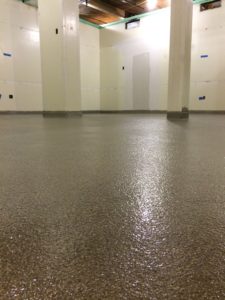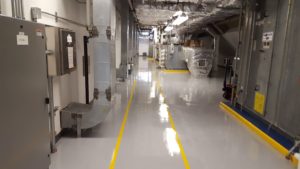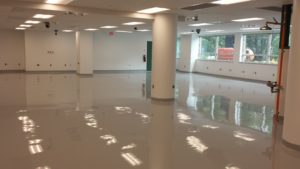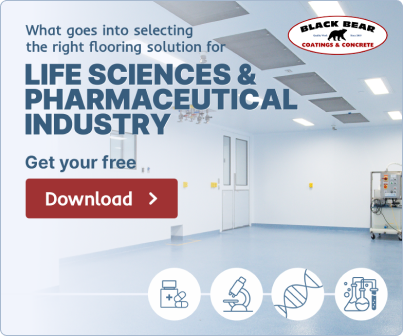When 
Resinous Coatings Protect Your BioTech Flooring Year After Year
Resinous coatings start with a substrate of concrete, which has been allowed to fully cure and dry, then a coating is spread over it. This coating could be made of several different materials, but the choices are generally either epoxy, MMA, or polyurethane. They all have the similar features but are formulated with different strengths. Epoxy, for example, is extremely strong against top-down crushing force, but is a bit brittle if hit by sharp falling objects. Polyurethane, on the other hand, is a little softer and less suited for heavy machinery but has significantly better heat resistance for spaces where extreme temperatures may be present. In all likelihood, if you’re building or retrofitting an entire facility, different rooms will have different coatings based on each room’s usage profile.
Each
This means there are no cracks or seams which can harbor microorganisms – a primary consideration when doing pharmaceutical or food/beverage manufacturing. These surfaces are also extremely easy to clean, since any spills can be cleaned up quickly. Sterilization is much easier to achieve with resinous flooring than with other types.
Resinous coatings are also completely non-permeable, so there’s no chance of liquids soaking into or through the flooring. They naturally resist most caustic chemicals as well, and specific formulations can be deployed if you need production against especially dangerous materials. This is one of the few flooring types which can be proofed against anything that might be found in a biotech lab.
On the other hand, you also don’t have to worry about the floor contaminating your work. Most resinous coatings are relatively inert by default and can be formulated to have no VOCs or other emissions which might escape the flooring.
Resinous
This combination of attributes results in resinous coatings being universally recognized as optimal solutions for the biotech industry. Black Bear Coatings & Concrete is the leading contractor in the Northeast. We take the time to assess each client’s needs, identify the best flooring solution, prep the floors and spaces, and specialize in meticulous installation techniques to ensure floors don’t fail. Our solutions go the distance, which is why more companies and leading brands trust Black Bear to engineer the right commercial and industrial floor system.



